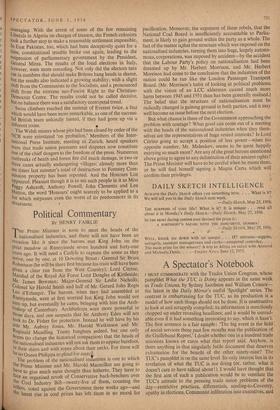Political Commentary
BY HENRY FAIRLIE THE Prime Minister is soon to meet the heads of the nationalised industries, and there will not have been an occasion like it since the barons met King John on the great meadow at Runnymede seven hundred and forty-one Years ago. It will need a Carlyle to capture the scene as they arrive, one by one, at 10 Downing Street: General Sir. Brian Robertson (he will be there first because his train will have been given a clear run from the West Country); Lord Citrine; Marshal of the Royal Air Force Lord Douglas of Kirtleside; Mr. James Bowman; Major-General Sir Leslie Nicholls; Colonel Sir Harold Smith and half of Mr. Gerard John Regis Leo d'Erlanger. The barons, when they had assembled at Runnymede, were at first worried lest King John would not turn up, but eventually he came, bringing with him the Arch- bishop of canterbury. Archbishops were more powerful in those days, and one suspects that Sir Anthony Eden will not 190k to Dr. Fisher for protection. Instead he will have by his side Mr. Aubrey Jones, Mr. Harold Watkinson and Mr. Reginald Maudling. Trusty burghers indeed, but one only hopes (to change the historical comparison) that the heads of the nationalised industries will not ask them to appear barefoot, 11 their shirts and with ropes about their necks, For there will be no Queen Philippa to plead for mercy;,. The problem of the nationalised industries is one to which the Prime Minister and Mr. Harold Macmillan are going to have to give much more thought than hitherto. They have to face an organised revolt of Conservative back-benchers over ,the Coal Industry Bill—twenty-five of them, counting the te. Hers, voted against the Government three weeks ago—and the latest rise in coal prices has left them in no mood for pacification. Moreover, the argument of these rebels, that the National Coal Board is insufficiently accountable to Parlia- ment, is likely to gain ground within the party as a whole. The fact of the matter isrthat the structure which was imposed on the nationalised industries, turning them into huge, largely autono- mous, corporations, was imposed by accident—by the accident that the, Labour Party's policy on nationalisation had been dreamed up by Mr. Herbert Morrison. and Mr. Herbert Morrison had come to the conclusion that the industries of the nation could be run like the London Passenger Transport Board. (Mr. Morrison's habit of looking at political problems with the vision of an LCC alderman caused much more harm between 1945 and 1951 than has been generally realised.) The belief that the structure of nationalisation must be radically changed is gaining ground in both parties, and it may well become an issue before the next election.
But what chance is there of the Government approaching the problem with courage'? What good can come out of a meeting with the heads of the nationalised industries when they them- selves are the representatives of huge vested interests'? Is Lord Citrine going to accept a position of less power—when his opposite number, Mr. Malenkov, seems to be quite happily enjoying so much more? Are any of the great barons mentioned above going tp agree to any delimitation of their ancient rights? The Prime Minister will have to be careful when he meets them, or he will find himself signing a Magna Carta which will confirm their privileges.


































 Previous page
Previous page